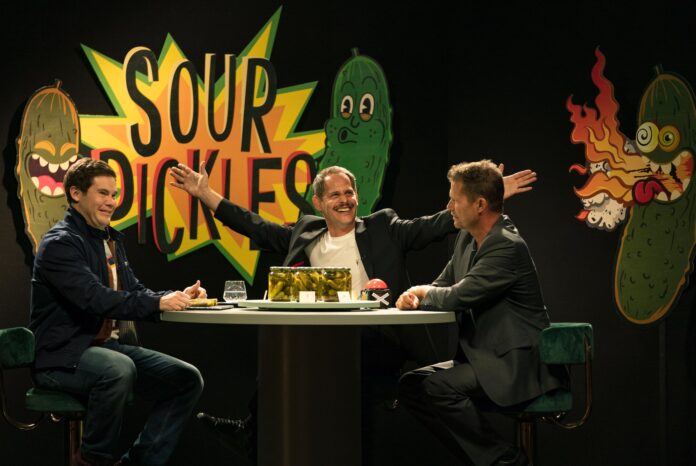“Pitch Perfect: Bumper in Berlin,” premiering November 23 on Peacock, is an amiable spin-off from the hit films about a cappella performers. The six half-hour episodes each feature music and comedy as Bumper (Adam Devine), the self-proclaimed “king of mouth music,” is encouraged by disgraced a cappella performer Pieter Krämer (Flula Borg) to come to Germany to achieve stardom after Bumper’s mash-up of Nena’s “99 Luftballons” and a-ha’s “Take on Me” has gone viral there.
Of course, once Bumper arrives in Berlin, things are not quite what he expected. For starters, he is housed not in a 5-star hotel, but a hostel run by Ursula (Katharina Thalbach), who claims to be a witch. His musical partner is Pieter’s sister, Thea (Lera Abova), a bisexual, anarchist musician. Pieter’s assistant is Heidi (Sarah Hyland), an American army brat who is great at writing songs and singing but has little self-confidence. This motley crew has to get Bumper ready to perform at Unity Day and best Pieter’s cunning ex-girlfriend Gisela (Jameela Jamil) in the process.
“Bumper in Berlin” coasts mainly on Devine’s comedic shtick. The actor is a whirling dervish, moving his mouth, his face, his voice, and his body tirelessly every moment he is on screen. Devine is certainly amusing delivering some one-liners, but he can be annoying when he is trying to be charming — which is part of the show’s like-it-or-not humor. But to his credit, Devine is comfortable making a fool out of himself and that may induce laughs. Several of the jokes land, but too many, like Bumper’s objectification of Angela Merkel, are unfunny, and fall flat. The characters often say dumb things or contrive absurd situations, such as Thea eating pills she finds on the ground.
Devine is actually best when Bumper belts out songs in the series. One sequence, where he performs Shaggy’s “It Wasn’t Me” as lush romantic duet with Heidi is fabulous, with them dressed to the nines and dancing on a stage. Likewise, their impromptu rendition of Kenny Rogers and Kim Carnes’ “Don’t Fall in Love with a Dreamer” at an outdoor piano is terrific. (For “Modern Family” fans, the reuniting of these former costars is part of the show’s appeal.)
There is also an impressive performance of the earworm, “Barbie Girl,” by Aqua, as well as Roxette’s “It Must Have Been Love” that has each main character singing a stanza to express their emotions. Arguably, the best musical sequence is an infectious version of Mark Ronson’s “Valerie” with the lyrics changed to “Heidi” — that opens Episode 5. It feels like something out of a Broadway musical with Bumper singing in the streets with backup dancers gyrating behind him.
However, the show’s plotting is a bit silly. There is a storyline involving a misunderstanding when Bumper is credited for a song Heidi wrote. It creates a kerfuffle when Bumper goes on “Sour Pickle,” a ridiculous German talk show — guests have to answer questions while eating a series of increasingly more sour pickles. The segment does feature fun cameos by German actors Moritz Bleibtreu and Til Schweiger as the hosts.
There is also a storyline that has Bumper try to change up his dorky image with the help of Klaus (Udo Kier), a famous artist who imagines a rather awkward scenario for Bumper’s transformation. Kier is wonderfully droll in his scenes and his costumes are, pardon the pun, pitch perfect.
“Bumper in Berlin” gets enough elements right that it is hard not to want the show to be stronger overall. There are only a few a cappella performances in the series, and the songs are highlights. A “riff-off” where Bumper faces Gisela, who comes across as an ersatz Lady Gaga, is great fun that there should have been more moments like that instead of extended scenes of Bumper experiencing personal and professional heartbreak.
Things get trickier when Bumper’s appearance at Unity Day is jeopardized. As the show limps toward its manic conclusion, the musical scenes will hold viewers’ interest, even if the big Unity Day concert is less visually spectacular than a Brezelfest performance in the first episode.
Bumper encounters a series of setbacks as he tries to achieve his dream, but they generate only the faintest of interest. He falls in love with Heidi — no surprise — but the show might have had some verve if Bumper had been gay. (All the female characters talk about having sexual interest in both genders, which makes Bumper and Pieter’s heterosexuality stand out.) The relationship between Bumper and Heidi is complicated for typical romcom reasons, but it fails to persuade.
The cast is game even if the material is often mediocre. Sarah Hyland’s perky energy provides a nice contrast to Flula Borg and Lera Abova’s deadpan line deliveries. But just as Bumper plays to his strength — in that he ruins things — “Bumper in Berlin” suggests that perhaps the “Pitch Perfect” formula is starting to yield diminishing returns.

